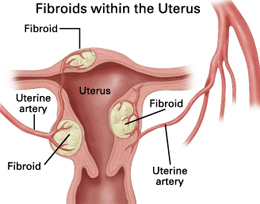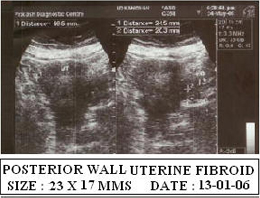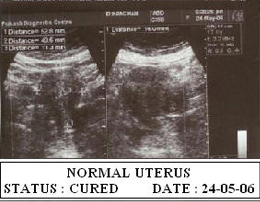
A uterine fibroid is a non-cancerous (benign) tumor that originates from the smooth muscle layer (myometrium) and the accompanying connective tissue of the uterus. Most fibroids are asymptomatic, they can grow and cause heavy and painful menstruation, painful sexual intercourse, and urinary frequency and urgency.
Location
Different locations are classified as follows:
• Intramural fibroids are located within the wall of the uterus and are the most common type; unless large, they may be asymptomatic .
• Subserosal fibroids are located underneath the mucosal (peritoneal) surface of the uterus
• Submucosal fibroids are located in the muscle beneath the endometrium of the uterus and distort the uterine cavity;
• Cervical fibroids are located in the wall of the cervix (neck of the uterus).
Fibroids may be single or multiple. Most fibroids start in an intramural location

Symptoms
Generally, symptoms relate to the location of the lesion and its size (mass effect). Important symptoms include abnormal gynecologic hemorrhage, heavy or painful periods, abdominal discomfort or bloating, painful defecation, back ache, urinary frequency or retention, and in some cases, infertility. There may also be pain during intercourse, depending on the location of the fibroid. During pregnancy they may be the cause of miscarriage, bleeding, premature labor, or interference with the position of the fetus.
Diagnosis
(a) Bimanual examination (b) Gynecologic ultrasonography (ultrasound)
(c) Hysterosalpingography (d) Sonohysterography.

Expectant management
The presence of fibroids does not mean that they need to be treated; lesions can be managed expectantly depending on the symptomatology and presence of related conditions. Thus most cases of fibroids are managed by "watchful waiting" which includes periodic sonographic assessment. After menopause fibroids shrink and it is unusual for fibroids to cause problems.
Homeopathic treatment
It is time for Homeopathy to prove to the world what homeopathy can offer in surgical diseases. Homeopathic medicines cannot take the place of surgery but can be of great help to the patients who do not want to go for surgery or cannot be operated upon due to various medical reasons. It is also ideal for underdeveloped and developing countries where financial factors play a major role in deciding the options for treatment. Homeopathic treatment for uterine fibroids is very efficient and in many cases may be the only treatment ever needs to get healthy again.
There are indeed Homeopathic remedies for uterine fibroids. However, a person should not wait to take them until the condition becomes serious. If there is a noticeable change in the menstruation patterns such as more bleeding or pain associated with it, then you need to see a Homeopathic Physician. Early detection and homeopathic remedies can likely lead to the elimination of these tumors.